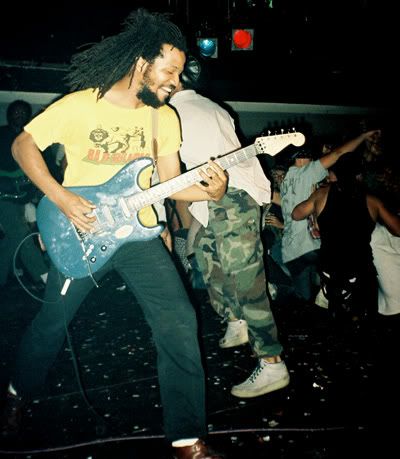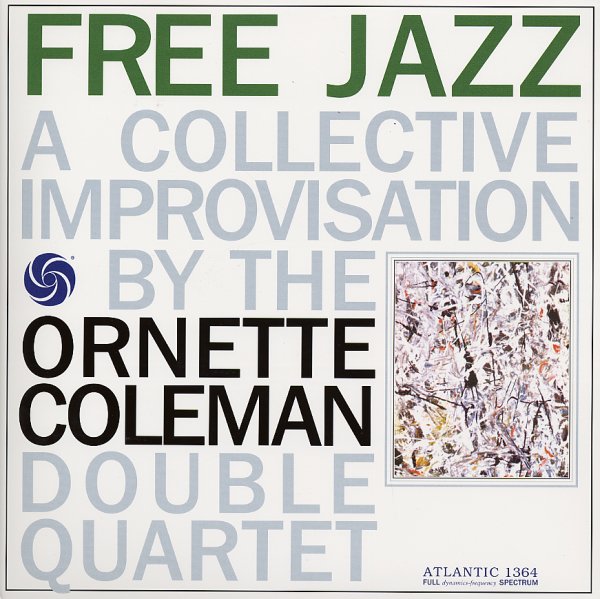
BBC 6 recently conducted a listener poll to find out who they think the ten best guitarists of the last 30 years were. They picked John Frusciante of the Red Hot Chili Peppers as #1.
As you can probably already tell, the list was not great. Here it is in full:
1. John Frusciante(Red Hot Chili Peppers)
2. Slash
3. Matt Bellamy(Muse)
4. Johnny Marr(The Smiths)
5. Tom Morello(Rage Against The Machine)
6. Kirk Hammett(Metallica)
7. Jonny Greenwood(Radiohead)
8. Prince
9. Jack White
10. Peter Buck(REM)
Holy crap, dude. Some of these I get, but Matt Bellamy of all fucking people?! And the guy from REM? Wasn't his whole thing that he couldn't play the guitar all that well?
All things told it's pretty standard stuff, not too surprising. Still, here are ten other guitarists to consider for the best of the last 30 years. I included some "teams" because it's hard to know who's playing what sometimes and also that's how a lot of bands get their sound. I'm also starting the 30 year limit from studio albums, so yes, I realize some of these guys were on EPs in the '70s. Also keep in mind that I'm not flat-out saying "These are the ten best of the last decade, straight up". They're just ten guitarists that I happen to like a lot more than most of the ones they listed. Don't see this as a definitive list, by any means.
Greg Ginn(Black Flag)
Along with Minor Threat guitarist Lyle Presnar, Greg Ginn helped define what the new era of punk would sound like. So why does he make the list instead of Presnar? Pure, visceral rage. His guitar sounds absolutely furious, and he was able to rip out a solo like nobody's business. As inimitable as bandmate Henry Rollins' vocals were, Ginn's guitar work is driving, frantic and dissonant in a way that gets across the anger of the hardcore scene in a way that no other punk guitarist since has quite been able to capture.
Essential Tracks: "Rise Above", "Damaged I", "Nothing Left Inside"
Omar Rodriguez-Lopez(At The Drive-In, The Mars Volta)
Say what you will about the excesses he displays when playing with The Mars Volta(and you can say quite a bit), but Omar Rodriguez-Lopez is one of the closest things we have today to a guitar god. His use of effects pedals in his "war against the guitar"(he actually said that!) has resulted in some of the most awe-inspiring tone this side of Tom Morello, and his jazz-infused compositions are close to untouchable in terms of sheer skill. His driving prog-punk guitar with At The Drive-In and his samba/jazz/progressive/classic rock inspired playing with The Mars Volta are distinct from each other, but are both unmistakable as only being able to come from one person in music today.
Essential Tracks: "Arcarsenal", "Sleepwalk Capsules", "Cassandra Gemini"
Chuck Schuldiner(Death, Control Denied)

Let's not even take into account that the man invented an entirely new subgenre of music in the form of death metal. Even if he was a latecomer to the genre, Chuck Schuldiner would have earned his status as one of the greatest guitarists to ever live. Chuck started off playing with an ultra-fast, impossibly heavy grind, the likes of which nobody had ever heard before. Not content to rest on his laurels, Schuldiner grew as a guitarist and started learning more progressive techniques, and by the time that Death's final album, The Sound of Perseverance, rolled around, Schuldiner had perfected his guitar playing into an assault that was as savage as it was technical, shooting out licks and solos that left other metal guitarists speechless with awe. We'll never know where he could have taken the genre before his tragic passing, but even with his brief time on this earth, Chuck Schuldiner proved that he was one of the greats, no matter what genre you're talking about.
Essential Tracks: "Scream Bloody Gore", "Crystal Mountain", "Flesh And The Power It Holds"
Elfrim Menuck, David Bryant and Roger Tellier-Craig(Godspeed You! Black Emperor)

When you think of the greatest guitarists of the generation, Godspeed You! Black Emperor probably isn't the first band that comes to mind. That said, GYBE's powerful guitar playing comes not as much from the sheer technical ability of the guitarists, but from their ability to integrate their playing into an orchestral setting. The violins and the cellos provide the backdrop and the grounding for the music, but it's Elfrim, Bryant and Tellier-Craig that really take the music to their heights. GYBE's songs often build to an emotional climax, and when that happens it's usually the guitars that are whirring like enraged mosquitoes or humming along and blending in in such a way that you can hardly tell they're there. That said, their presence in the song is always felt, and when it's time for the song to explode it's the guitar playing that's forcing you to your knees. It's these three guitarists' ability to make the music feel spiritual, to push the music through its stages almost from behind the scenes, that almost reinvents the idea of what a guitar can be used for in music.
Essential Tracks: "The Dead Flag Blues", "East Hastings", "Sleep"
Buzz Osborne(Melvins)
Buzz Osborne has played the guitar and led his band through every incarnation of music from hardcore punk to grunge to sludge metal to straight-up avant-garde, and he's excelled at every single one. One thing that he's never lost no matter what genre he's playing, though? His signature, unmistakable boom. When it comes to guitar riffs that melt through your body like molten syrup, Osborne is almost impossible to top. His guitar playing is slow, heavy and menacing, always rushing right to the throat, and he never plays the same riff twice. That sounds small, but when making "heavy" music it's easy for all your songs to sound the same, and Osborne hasn't fallen into that trap once in almost 25 years. A major contributor to the creation of what we know today as "stoner metal", Buzz Osborne is arguably the heaviest guitarist of the last 30 years. And if he isn't, then the guy who is knows who to thank.
Essential Tracks: "Boris", "Honey Bucket", "Civilized Worm"
Josh Homme(Kyuss, Queens of the Stone Age)
If "hard rock" is a pejorative term in music today, I'm almost inclined to state that it shouldn't be, simply because Josh Homme does it so fucking well. Starting out with stoner metal band Kyuss and eventually forming the chart-topping Queens of the Stone Age, Josh Homme may not be the most technical guitarist working today, but he very well might be the smartest. He knows how to distill that smokey, feel-it-in-your-guts sensation that a good classic rock riff can give you and combine it with a pounding, larger than life edge that leaves you clamoring for more. It's simple and fun, but also dangerous, like blowing up home-made bombs on the railroad tracks. Guitarists can be described with any number of adjectives, but "addictive" is rarely one of them. When it comes to Josh Homme's playing, it's the first word that pops to mind.
Essential Tracks: "Green Machine", "Monsters In The Parasol", "Battery Acid"
Kerry King and Jeff Hanneman(Slayer)
Do you hate metal? Do you like it? Either way, these two guys are the ones you need to thank/despise, because almost every metal song since 196's Reign in Blood has been a direct result of the guitarwork of Kerry King and Jeff Hanneman. Finding squealing, echoing tones that were previously unheard of in metal and playing them at impossibly fast speeds, every metal guitarist out there owes a huge debt to these two pioneers. They started off with a more New Wave of British Heavy Metal sound, but by the time the mid '80s rolled around these two had become a force unto themselves, and it's largely due to the frenzied, eardrum-bursting solos of King and Hanneman. Even when they slow it down and meld into a fierce groove they pack the force of a nuclear bomb, proving that they can dominate the genre no matter what kind of metal they're playing. I'm not a huge Slayer fan, but seriously: Bow your head to these motherfuckers.
Essential Tracks: "Angel of Death", "Seasons in the Abyss", "Jihad"
Isaac Brock(Modest Mouse, Ugly Casanova)
Indie music: Kiss this man's ass. No, for real. Isaac Brock can do everything you guys can and more. He can play ambient, gliding through spacey, echoing chords like a fish through water. He can play epic, epic enough to get your heart to swell at the very first note. He can do gut-buckety ass garage rock, slamming through his strings like the production budget was five bucks and a sandwich and still practically physically forcing your body to rock like all holy hell. And through every single style he plays through-and he plays through a lot-he never loses the slightest bit of precision, never fails to make the tone something you've never quite heard before. He is one of the cleanest, most innovative guitar players working today. Your music is "real"? This guy breathes real, and he doesn't have to sound like an amateur to pull it off. What've you got?
Essential Tracks: "Teeth Like God's Shoeshine", "Doin' The Cockroach", "I Came As A Rat"
Dave Mustaine and Marty Friedman(Megadeth)
What in the living hell is that noise? That's your jaw slapping the floor as you hear the neigh-unbeatable team of Marty Friedman and Dave Mustaine playing with the hands of the devil himself. With Mustaine's rhythmic fundamentals, Friedman's classical training and a musical chemistry that is rivaled only by King and Hanneman, these two created the most iconic metal anthems of the '90s. Forget "Enter Sandman": Give "Hangar 18" a spin if you want to see what real metal should've been aiming for in the grunge era. To this day, many guitarists cite that song as one of the most difficult to play, ever. Now imagine those kinds of riffs and that magnitude of blinding solos filling two whole albums and-hey man, you wanna do something about that jaw? You're getting slobber all over my floor.
Essential Tracks: "Hangar 18", "Tornado of Souls", "Psychotron"
Joey Santiago(Pixies)
Tell me, have you enjoyed an alternative rock song made in the past 25 years? You should talk to this man. And then thank him with all your heart.
Essential Tracks: "Gigantic", "Vamos", "Debaser"
HONORABLE MENTIONS:
- East Bay Ray(Dead Kennedys)
- Britt Daniel(Spoon)
- Joe Satriani
- Matt Pike(Sleep, High On Fire)
- The Reverend Horton Heat
- Spencer Seim(Hella)
- Tyondai Braxton(Battles)
- Jus Osborn(Electric Wizard)
- Judah Nagler(The Velvet Teen)
- Wata(Boris)
- Davey von Bohlen/Victor Villarreal(Cap'n Jazz)
- Ian Mackaye/Guy Picciotto(Fugazi)
- Paul Masvidal(Death, Cynic, Aeon Spoke)
-CJ




































